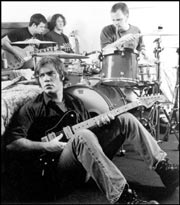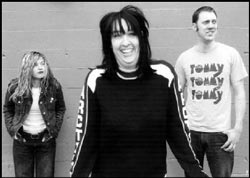SLOBBERBONE
RADIO NATIONALS
Tractor Tavern, 206-789-3599, $8 10 p.m. Sat., Jan. 25
You wouldn’t need to listen to more than, say, 30 seconds of Slobberbone’s latest album, Slippage, to pick up on the group’s puckish, ragamuffin charm; nothing beyond the initial volley of feedback, the careening cymbal crashes, or just a single weary, aching couplet to be swayed and moved by their noise.
Given their blustery, besotted sound, it’s no great surprise to find out the band—launched nearly a decade ago in Denton, Texas—originally formed to play a kegger at a friend’s house. While Slobberbone may have been started as a laugh among friends (certainly the band’s moniker indicates the sprit in which it was conceived), the group quickly pursued its art with a ragged, lurching tenacity that matched the members’ beer-soaked, sweat-stained appearance.
For the latter half of the ’90s, Slobberbone were considered alt-country’s resident ruffians. Coming off like Dickensian urchins—artful dodgers with Texas drawls—they played a style of music many in the movement considered too rough, too loud, ultimately too rock, for their narrow tastes. It was, perhaps, easy to dismiss the group for the same reasons, even as the band fired back with punishing rejoinders like 1996’s Crow Pot Pie and 1997’s Barrel Chested.
By the time 2000’s Everything You Thought Was Right Was Wrong Today saw its release, even the most stone-faced critics could no longer marginalize their efforts. The disc—an uncommonly literate, yet pugnacious, song cycle—showcased a breadth that belied their hardscrabble bar-band image and the gruff timbre of singer/songwriter Brent Best’s voice.
Moreover, the record proved an expansive sonic foray, with the group deploying a small army of musicians and instruments—banjos, mandolins, lap steels, horns, tubas; anyone and anything it could get its hands on seemed to find a way onto the album.
“We tried doing as much as we could on that record, if for no other reason than to clear the decks for ourselves,” says Best. “That way, we knew for the next one, we could make whatever the hell kind of record we felt like.”
DECKS CLEARED, the group entered L.A.’s Rumbo Studios last year with producer/ engineer Don Smith (Rolling Stones, Tom Petty, Cracker) to record its fourth full-length. When Best sat down with Smith to preview the songs earmarked for the album acoustically, it became clear that this cache of cuts would be different than any other Slobberbone had committed to tape.
“Before this record, I’d written the same way for years,” admits Best. “Which meant I tended not to finish a song unless it was something that kinda wrote itself. And those ended up being simpler songs, progressionwise.”
All that changed after the band completed its last record in Memphis. On the trip back to Texas, Best picked up an old, battered church organ and soon began fumbling his way around the instrument. Discovering new voicings and chordings for his songs on the keyboard, then transposing them back to guitar, the unusual, through-the-wringer compositional approach yielded a batch of material full of Slobberbone’s usual rasping rock but underpinned by a foundation more musical than anything in the band’s canon.
“That’s really the difference in these songs—is how they were kinda developed,” says Best. “It ended up infusing everything—writing the melodies and even writing some of the words.”
Longtime fans of Slobberbone’s patented twang ‘n’ bang needn’t fret, however. Slippage doesn’t quite recast Best as an effete pop tunesmith—although songs like “Springfield, IL” and “Stupid Words” make it easier to glimpse moments of melodic finery amid the band’s usual blur of scrapping, lacerating blues. (As if to underscore the point, the album includes a significantly toughened take on the Bee Gees’ ballad “To Love Somebody”.)
Lyrically, Best continues to prove himself one of rock’s more underrated wordsmiths as he inhabits a world of dashed dreams (“Live On in the Dark”), while straddling the corpses of murdered relationships (“Write Me Off”) and casting an impervious eye to the cruel hypocrisies of workaday life (“Butchers”).
Smith’s production is, as usual, the stuff of raw Keith Richards-riffed dreams: buzzing amps, trash-can snares, guitars bleeding beautifully into drum mikes. More importantly, Smith creates an unadorned atmosphere, ultimately yielding an aural document of the band as it actually sounds live.
While Slippage isn’t the all-out, kitchen-sink assault of Slobberbone’s last album, it doesn’t have to be. More than ever, the band members sound comfortable in their own skin and confident they no longer have to prove anything to anyone—including themselves.
THE TERM “Big in Europe” used to be a rock critic’s euphemism for “Unpopular in the United States.” Not so much these days, as a growing legion of performers, especially roots musicians, are finding massive appreciation and audiences overseas. Slobberbone—who maintain a healthy stateside profile thanks to sheer will and endless touring—seem to have benefited from the phenomenon almost by accident.
“Unbeknownst to us, the first record did really well in Europe—just through mail order. By the time Barrel Chested came out, [European] promoters found my home number and were calling the house,” says Best. “When we got over to Amsterdam for the first time, there were like 2,200 people in the audience and they knew the words to every song. It was like a dream.”
It shouldn’t seem odd that Europeans have embraced Slobberbone so passionately and without reservation. After all, international listeners tend to be less caught up in the distracting genre-tag semantics and next-big-thing bandwagon-jumping that plague their American counterparts.
“Plus, they have a better sense of music history than people do over here,” says Best. “So when they look at a band, they can measure ’em compared to that, as opposed to here, where bands tend to be measured against whatever’s big on the radio at the moment.
“As far as I’m concerned, we have always been a rock band. We did get shoehorned uncomfortably into the alt-country movement for a while, but it didn’t really bother us all that much. That kind of thing is only a problem if you think about it too much.”
Likely Slobberbone will leave the overwrought intellectualizing to someone else, while they continue to rely on an effusive combination of instinct and amp wattage that’s gotten them much farther than anyone could’ve possibly expected.
“We started this whole thing for fun, and we’re not gonna chase any brass rings. I mean, if you decide to start a band and name it Slobberbone to play someone’s house party,” Best laughs, “I think it’s pretty funny that nine years later we’re still here making a living doing it.”









